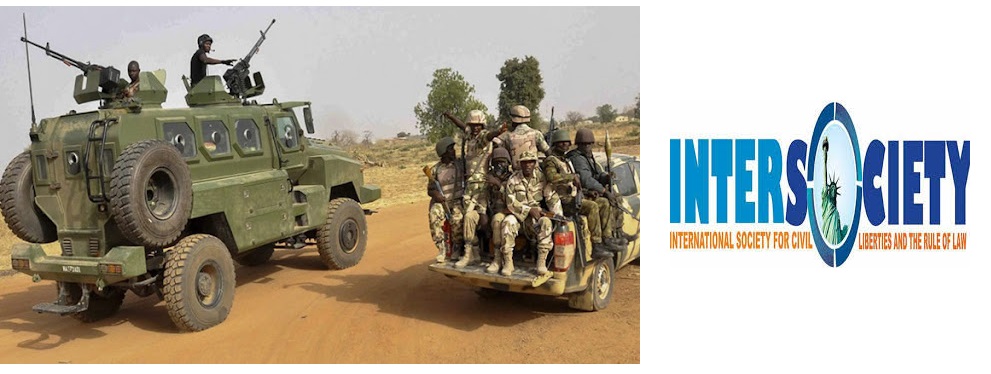
Intersociety Urges Nigerian Military to Restore Neutrality and Secure Over 850 Christian Hostages in Rijana Forest
Abuja, Nigeria – September 28, 2025
The International Society for Civil Liberties and Rule of Law (Intersociety) has issued a strong appeal to the Nigerian Defense Headquarters and the Nigerian Army to reclaim the Armed Forces’ pre-June 2015 neutrality, secularity, and semi-professionalism, a posture that once earned the institution a public trust level of roughly 45%. According to the human rights organization, confidence in the military has since plummeted below 20%, particularly among civilians in the South-East region and communities in the North.
In a report released on Sunday, Intersociety detailed what it described as systemic challenges affecting Nigeria’s security apparatus over the past decade, highlighting ethno-religious imbalances, compromised neutrality, and collusion with terrorist groups in the North. The organization cited the military’s engagement in negotiations and pacifications with terrorist groups and their allies, which it reveals has contributed to the continued targeting of civilians, resulting in thousands of deaths, mass displacements, and widespread destruction of property across the country.
The Rijana Forest Crisis
A particularly urgent concern identified in the report is the situation in Rijana Forest, Kaduna State, where more than 850 Christian hostages remain in captivity under jihadist control, despite the forest’s proximity to Nigerian Army formations. The findings, based on a September 4, 2025 special report by Truth-Nigeria titled “Inside Rijana: Nigeria’s Forest of (Christian) Hostages”, reveal that the forest is situated along the Kaduna-Abuja Expressway and is home to key military sites including the Table Hill Training Area and the Army School of Artillery, reechoing various confessions from terrorists that the military provide cover for them.
Investigations indicate that between December 2024 and August 2025, Kaduna State recorded over 1,100 abductions of Christians, with 850 individuals still detained in multiple camps within the forest. At least 100 captives were reportedly killed during this period. Former hostages, interviewed by Truth-Nigeria, described over eleven major camps holding over 50 captives each and at least ten smaller camps with around 30 hostages each, all under armed guard and named after camp commanders. Among those freed were sisters Maureen, Esther, and Anita, whose release came after weeks of torture at Rijana Forest and ransom payment of N2.3 million in August 2025.
“This is to the extent that there are not less than 850 Christian hostages languishing inside the Rijana Forest, under the captivity of Fulani Jihadists and allied others, out of which about twenty have been freed including eight freed in February after ransom payment of N40m or about $30,000, according to researchers and investigators working for Truth-Nigeria”
According to the report, the continued captivity of these Christians near military sites underscores a failure of the armed forces to protect civilians, raising questions about operational priorities and oversight.
Military Neutrality and Secularity
Intersociety’s report emphasizes the need for the Nigerian military to reaffirm its neutrality and secular professionalism, warning that partisan or ethno-religiously biased operations erode public confidence and exacerbate tensions across the country. The organization criticized the military’s current approach, which, in its view, romances jihadist elements in the North while exercising disproportionate force against Eastern civilians, including confiscation of legally owned firearms under the Firearms Act of 2004.
The report further highlights that military and police misconduct in the East remains rampant. Field monitoring shows that over 80% of roadblock personnel are involved in extortion, with up to 70% neglecting core duties. Such practices, coupled with extrajudicial measures, indefinite detentions, and unlawful killings, reinforce perceptions of distrust and marginalization.
Call for Ethno-Religious Balancing in the South-East
Intersociety also raised concerns over the dominance of Northern Muslim officers in senior military postings in the South-East, a region with more than 95% Christian population. The report argues that such imbalances compromise trust in security forces and aggravate regional tensions. Notably, four top commanders in Imo State, Brigadier Gen Ibrahim Abbas, Air Commodore D.E. Bello, Navy Commodore M.A. Alhassan, and Commissioner of Police Aboki Danjuma are all of Northern extraction.
The organization recommends ethno-religious balancing in senior appointments to restore public confidence, safeguard psychological wellbeing, and ensure equitable law enforcement across Nigeria.
Urgent Action Required
Intersociety calls on the Nigerian Army and Defense Headquarters to:
-
Return to pre-2015 operational neutrality and secularity, reinforcing professionalism and public trust.
-
Rescue the more than 850 Christian hostages currently held in Rijana Forest camps and ensure their safe reintegration.
-
Address military and police misconduct, including extortion, abuse of authority, and violations of statutory law.
-
Implement fair posting policies that reflect Nigeria’s ethno-religious diversity, particularly in sensitive regions like the South-East.
The report underscores that failure to act decisively risks further erosion of public trust, increased ethno-religious tensions, and continued human rights violations across the country.
Sources:
International Society for Civil Liberties and Rule of Law (Intersociety: https://intersociety-ng.org)
Truth-Nigeria, Inside Rijana: Nigeria’s Forest of (Christian) Hostages, Sept 4, 2025 (https://truthnigeria.com)